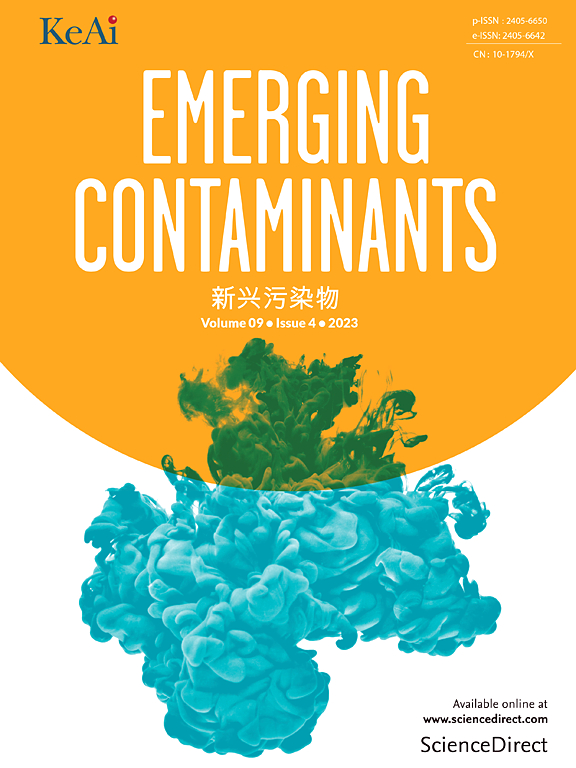过去 32 年(1990-2022 年)尼日利亚电气和电子设备及相关塑料和持久性有机污染物塑料添加剂进口综合清单
IF 6.9
2区 环境科学与生态学
Q1 ENVIRONMENTAL SCIENCES
引用次数: 0
摘要
电气和电子设备(EEE)及相关塑料的全球管理以及其中所含的持久性有机污染物(POPs)是一项全球性挑战,尤其是对于缺乏监测能力和废物管理基础设施的非洲低收入国家而言。虽然塑料回收利用被强调为塑料污染解决方案的重要组成部分,但这种回收利用却受到持久性有机污染物的威胁。总体而言,除了多溴联苯醚之外,缺乏关于(可湿性电子电器产品)塑料中持久性有机污染物的数据。本研究的目的是分析尼日利亚的(废)电子电器设备进口总量,并估算相关塑料和持久性有机污染物的数量,以便更好地规划和管理废电子电器设备塑料。本研究评估了所有电子电气设备的进口类别,并根据联合国商品贸易数据库,使用协调制度(HS)编码,汇编了进口量最大的 28 个电子电气设备产品组的进口情况,涵盖了 98% 以上的官方进口电子电气设备。估算时使用了环境署清单指南中的持久性有机污染物和塑料影响因子。总体而言,1990 年至 2022 年间官方进口了 4568 千吨(kt)的电子电器设备,其中包含 1337 千吨塑料。如果将商品贸易统计中未涵盖的估计进口废弃电子电器设备和电子电器设备也考虑在内,则(废弃)电子电器设备的进口总量估计为 12,259 千吨,其中包括 3644 千吨塑料、作为主要持久性有机污染物添加剂的估计 1043 吨六溴二苯醚/七溴二苯醚和 8511 吨十溴二苯醚,以及较低水平的 154 吨六溴环十二烷、91 吨短链氯化石蜡、364 吨中链氯化石蜡和 146 吨脱氯剂。该研究首次对低收入国家(湿)电子电器设备塑料中的所有主要持久性有机污染物进行了估计,为其管理提供了重要信息。本文章由计算机程序翻译,如有差异,请以英文原文为准。
Comprehensive inventory of imports of electrical and electronic equipment and related plastics and POPs plastic additives into Nigeria in the past 32 years (1990–2022)
The global management of electrical and electronic equipment (EEE) and related plastics, and the persistent organic pollutants (POPs) contained in it constitute a global challenge in particular for low-income countries in Africa where monitoring capacity and waste management infrastructure are lacking. While plastic recycling is highlighted as an important part of the solution to plastic pollution, such recycling is threatened by the presence of POPs. Overall, there is a lack of data on POPs in (W)EEE plastics with the exception of PBDEs. The objective of this study was to analyse the overall imports of (W)EEE into Nigeria and estimate the associated amount of plastics and POPs for better planning and management of WEEE plastics. This study assessed all EEE importation categories and compiled the importations of 28 EEE product groups with the highest importation, covering more than 98 % of officially imported EEE based on the United Nations Comtrade Database using harmonized system (HS) codes. The impact factors of POPs and plastic from the UNEP inventory guidance were used for the estimates. Overall, 4568 kilo-tonnes (kt) of EEE were officialy imported between 1990 and 2022 containing 1337 kt of plastic. If considering also the estimated imported WEEE and EEE not covered in the Comtrade statistics, the total imported (W)EEE is estimated to 12,259 kt including 3644 kt of plastics and an estimated 1043 t of hexaBDE/heptaBDE and 8511 t of DecaBDE as major POP additives, and lower levels of 154 t of HBCD, 91 t of SCCPs, 364 t of MCCP, and 146 t of Dechlorane Plus. The study is the first estimate of all major POPs in (W)EEE plastics in a low-income country and provides important information for their management.
求助全文
通过发布文献求助,成功后即可免费获取论文全文。
去求助
来源期刊

Emerging Contaminants
Medicine-Public Health, Environmental and Occupational Health
CiteScore
10.00
自引率
6.70%
发文量
35
审稿时长
44 days
期刊介绍:
Emerging Contaminants is an outlet for world-leading research addressing problems associated with environmental contamination caused by emerging contaminants and their solutions. Emerging contaminants are defined as chemicals that are not currently (or have been only recently) regulated and about which there exist concerns regarding their impact on human or ecological health. Examples of emerging contaminants include disinfection by-products, pharmaceutical and personal care products, persistent organic chemicals, and mercury etc. as well as their degradation products. We encourage papers addressing science that facilitates greater understanding of the nature, extent, and impacts of the presence of emerging contaminants in the environment; technology that exploits original principles to reduce and control their environmental presence; as well as the development, implementation and efficacy of national and international policies to protect human health and the environment from emerging contaminants.
 求助内容:
求助内容: 应助结果提醒方式:
应助结果提醒方式:


